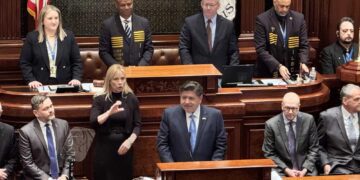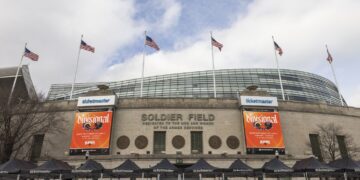CHICAGO – Governor Pritzker's office couldn't wait to send out the figures on Illinois' first week of recreational cannabis sales – Illinoisans volunteered nearly $11 million of their hard-earned dollars to fund 271,169 cannabis buys.
|
|
SALES |
TRANSACTIONS |
|
Jan. 1 |
$3,176,256.71 |
77,128 |
|
Jan. 2 |
$2,252,586.51 |
56,762 |
|
Jan. 3 |
$2,209,065.01 |
55,161 |
|
Jan. 4 |
$2,004,019.43 |
51,174 |
|
Jan. 5 |
$1,189,252.18 |
30,954 |
|
TOTAL |
$10,830,667.91 |
271,169 |
From the Pritzker Administration's office:
As part of the state's focus on equity, 25 percent of cannabis sales tax revenues will support the Restore, Reinvest and Renew (R3) program, which aims to address the impact of economic disinvestment, violence and the historical overuse of the criminal justice system. The Department of Revenue expects to have a tax revenue estimate by the end of February, when initial tax payments from dispensaries are due.
“The successful launch of this new industry is a historic development for our state that will benefit the very communities that have been disproportionately impacted by the failed war on drugs,” said Toi Hutchinson, Senior Advisor to the Governor for Cannabis Control. “As we move into the next phase, the Pritzker administration is proud to see the robust interest in dispensary ownership from social equity applicants, and we encourage them to apply for $30 million in loans that we have available to reduce the capital barriers to entry. Unlike any state in the nation, Illinois has set the standard for what it means to legalize cannabis in a way that begins to right the wrongs of the past and gives new opportunity to those that have been left behind for far too long.”On Thursday, January 2, the Department concluded the first round of applications for new dispensary licenses. A preliminary count shows that more than 700 applicants submitted applications seeking almost 4,000 licenses. More than 600 of the applicants identified themselves as qualifying for social equity applicant status. The Department will award up to 75 new dispensary licenses, which will be announced by May 1, 2020.
The application process provides several avenues for social equity applicants that are unique in the nation. Of the total points possibly awarded during application scoring, 20 percent are designated for social equity applicants, who also receive a 50 percent waiver for non-refundable application and license fees.
To defray the start-up costs associated with entering the industry, social equity applicants have access to a low-cost loan fund, primarily funded by existing dispensaries, and are allowed 180 days from the license award date to identify a physical location for the dispensary. Ownership limitations are also in place to protect market share for new applicants. Following the awarding of the next round of dispensary licenses, the state will also conduct a disparity study to ensure the market reflects the equity goals of the historic legislation.







